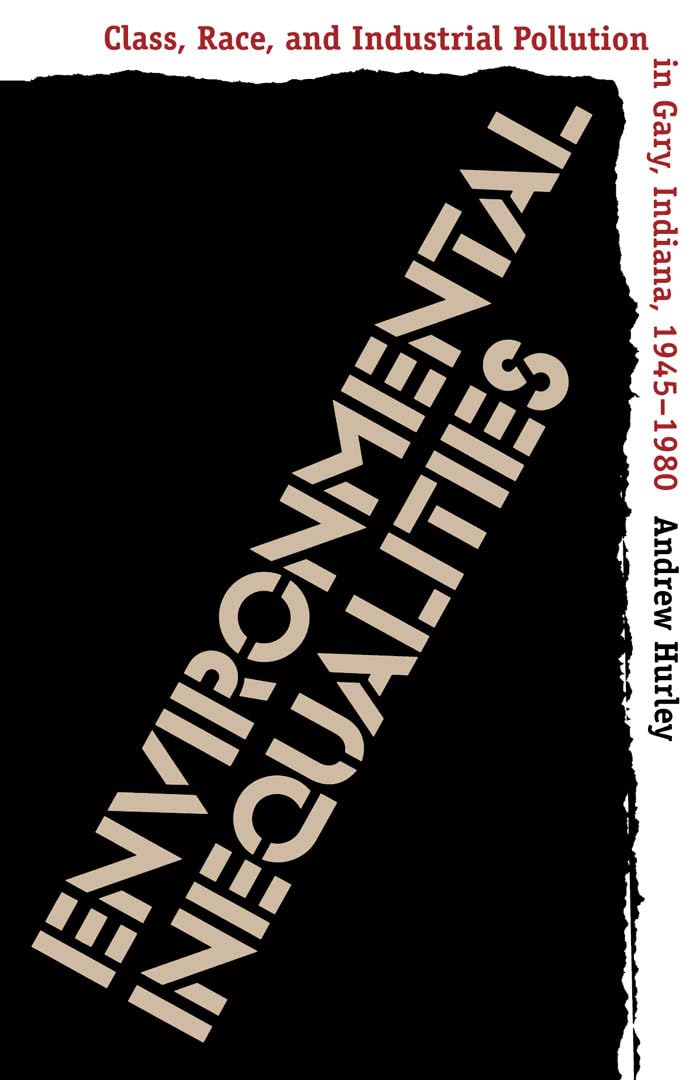
Title

Environmental Inequalities: Class, Race, and Industrial Pollution in Gary, Indiana, 19451980,Used
Delivery time: 8-12 business days (International)
By examining environmental change through the lens of conflicting social agendas, Andrew Hurley uncovers the historical roots of environmental inequality in contemporary urban America. Hurley's study focuses on the steel mill community of Gary, Indiana, a city that was sacrificed, like a thousand other American places, to industrial priorities in the decades following World War II. Although this period witnessed the emergence of a powerful environmental crusade and a resilient quest for equality and social justice among bluecollar workers and African Americans, such efforts often conflicted with the needs of industry. To secure their own interests, manufacturers and affluent white suburbanites exploited divisions of race and class, and the poor frequently found themselves trapped in deteriorating neighborhoods and exposed to dangerous levels of industrial pollution. In telling the story of Gary, Hurley reveals liberal capitalism's difficulties in reconciling concerns about social justice and quality of life with the imperatives of economic growth. He also shows that the power to mold the urban landscape was intertwined with the ability to govern social relations.
By changing our most important processes and
products, we have already made a big leap forward. This ranges from the
increased use of more sustainable fibers to the use of more
environmentally friendly printing processes to the development of
efficient waste management in our value chain.
⚠️ WARNING (California Proposition 65):
This product may contain chemicals known to the State of California to cause cancer, birth defects, or other reproductive harm.
For more information, please visit www.P65Warnings.ca.gov.
Shipping & Returns
Shipping
We ship your order within 2–3 business days for USA deliveries and 5–8 business days for international shipments. Once your package has been dispatched from our warehouse, you'll receive an email confirmation with a tracking number, allowing you to track the status of your delivery.
Returns
To facilitate a smooth return process, a Return Authorization (RA) Number is required for all returns. Returns without a valid RA number will be declined and may incur additional fees. You can request an RA number within 15 days of the original delivery date. For more details, please refer to our Return & Refund Policy page.
Shipping & Returns
Shipping
We ship your order within 2–3 business days for USA deliveries and 5–8 business days for international shipments. Once your package has been dispatched from our warehouse, you'll receive an email confirmation with a tracking number, allowing you to track the status of your delivery.
Returns
To facilitate a smooth return process, a Return Authorization (RA) Number is required for all returns. Returns without a valid RA number will be declined and may incur additional fees. You can request an RA number within 15 days of the original delivery date. For more details, please refer to our Return & Refund Policy page.
Warranty
We provide a 2-year limited warranty, from the date of purchase for all our products.
If you believe you have received a defective product, or are experiencing any problems with your product, please contact us.
This warranty strictly does not cover damages that arose from negligence, misuse, wear and tear, or not in accordance with product instructions (dropping the product, etc.).
Warranty
We provide a 2-year limited warranty, from the date of purchase for all our products.
If you believe you have received a defective product, or are experiencing any problems with your product, please contact us.
This warranty strictly does not cover damages that arose from negligence, misuse, wear and tear, or not in accordance with product instructions (dropping the product, etc.).
Secure Payment
Your payment information is processed securely. We do not store credit card details nor have access to your credit card information.
We accept payments with :
Visa, MasterCard, American Express, Paypal, Shopify Payments, Shop Pay and more.
Secure Payment
Your payment information is processed securely. We do not store credit card details nor have access to your credit card information.
We accept payments with :
Visa, MasterCard, American Express, Paypal, Shopify Payments, Shop Pay and more.
Related Products
You may also like
Frequently Asked Questions
- Q: What is the main focus of 'Environmental Inequalities' by Andrew Hurley? A: The book examines the historical roots of environmental inequality in urban America, specifically through the lens of the steel mill community in Gary, Indiana, between 1945 and 1980.
- Q: What themes are explored in this book? A: Key themes include the conflict between industrial priorities and social justice, the impact of race and class on environmental issues, and the struggles of blue-collar workers and African Americans for equality.
- Q: What is the condition of the book being sold? A: This book is listed as a 'Used Book in Good Condition', indicating that it may show some signs of wear but is still in a readable state.
- Q: Who is the author of 'Environmental Inequalities'? A: The author is Andrew Hurley, who focuses on environmental history and social justice issues.
- Q: When was 'Environmental Inequalities' published? A: The book was published on February 20, 1995.
- Q: What is the binding type of this book? A: The book is available in paperback binding.
- Q: How many pages does 'Environmental Inequalities' have? A: The book contains a total of 266 pages.
- Q: Is this book part of a specific category? A: Yes, it falls under the category of 'State & Local' environmental studies.
- Q: What edition of the book is being offered? A: This listing is for the First Edition of 'Environmental Inequalities'.
- Q: What can readers expect to learn from this book? A: Readers can expect to learn about the complexities of environmental inequality, the historical context of industrial pollution, and the socio-political dynamics that shape urban landscapes.
